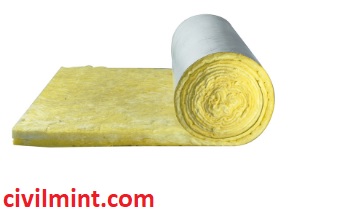This blog post is related advantages of thermal insulation in buildings. Let us get started.
Thermal insulation is used to separate the building temperature from the external environment. Due to thermal insulation building interior is less affected by external temperature.
Warm protection helps safeguard a structure’s inside so that it’s less impacted by the outside temperature, accordingly considerably diminishing the structure’s energy utilization, as well as energy costs. This can give business building proprietors the best profit from underlying speculation of practically any structure material, particularly assuming that the structure depends on heating and air-conditioning.

Thermal insulation helps to roof system reduce radiative losses. It helps to maintain the temperature in very cold and very hot weather. It provides comfort to the building occupants.
Main Advantages Of Thermal Insulation In Buildings
The main advantages of thermal insulation in the building are as follows.
- Thermal insulation decreases unwanted heat loss or gain and can reduce the energy consumption of heating and cooling systems.
- Thermally insulated buildings remain warm in winter and cool in summer, giving comfort in all seasons.
- Thermal insulating materials are fire-resistant
- Thermal insulation reduces the use of expansion joints in the building
- The process of thermal insulation is eco-friendly.
- Thermal insulation keeps buildings cozy by stopping heat from escaping.
- It helps save energy and lowers electricity bills.
- It helps to maintain a comfortable temperature inside the house.
- Insulation prevents cold drafts from entering the building.
- It keeps the heat inside during cold weather.
- Insulation blocks outside noises, making the building quieter.
- It reduces the need for excessive use of heaters and air conditioners.
- Insulated buildings are more environmentally friendly.
- It helps to reduce greenhouse gas emissions.
- Insulation keeps the building cooler on hot sunny days.
- It prevents condensation and mold growth inside the building.
- Insulated walls make the building stronger and more durable.
- It improves the overall comfort of living or working inside the building.
- Insulation makes the building more energy-efficient.
- It helps to conserve natural resources by reducing energy consumption.
- Insulation keeps the temperature balanced throughout the day.
- It reduces the need for frequent repairs and maintenance.
- Insulated buildings are healthier to live in, as they prevent moisture-related issues.
- It creates a comfortable environment for children to play and study.
- Insulation keeps the floors warm and comfortable to walk on.
- It helps to maintain a consistent temperature in all rooms of the building.
- Insulation lowers the risk of overheating during hot summer days.
- It improves the resale value of the building.
- Insulation contributes to a sustainable and eco-friendly lifestyle.
These are the advantages of thermal insulation in buildings.
Faqs
Thermal insulation reduces heat transfer in buildings, keeping them warmer in winter and cooler in summer, resulting in increased comfort and energy savings.
Thermal insulation provides a comfortable indoor environment by minimizing temperature fluctuations and drafts, improving overall comfort for occupants.
Yes, thermal insulation saves energy by reducing the need for heating and cooling, resulting in lower energy consumption and cost savings.
While focusing on heat transfer, thermal insulation indirectly enhances indoor air quality by reducing drafts and air leakage, preventing pollutants from entering the building.
Yes, thermal insulation materials can also act as sound barriers, reducing noise transmission from outside and between different areas within the building.
Installing thermal insulation leads to long-term financial benefits, as it lowers energy bills and increases the overall value of the building.
Yes, thermal insulation reduces energy consumption, which helps lower greenhouse gas emissions and promotes a more sustainable approach to building operations.
Thermal insulation can protect the building structure by minimizing condensation, which can lead to moisture damage and decay, extending the lifespan of the building.
Yes, thermal insulation is often a requirement in building codes and standards to ensure energy efficiency and occupant comfort.
Yes, thermal insulation can be installed in both new construction projects and existing buildings, providing benefits regardless of the building’s age or size.
